#Michèle Philippe
Explore tagged Tumblr posts
Text

Santa Claus Has Blue Eyes (Le père Noël a les yeux bleus), Jean Eustache (1966)
#Jean Eustache#Jean Pierre Léaud#Gérard Zimmermann#Henri Martinez#René Gilson#Michèle Maynard#Carmen Ripoll#Maurice Domingo#Daniel Lacambre#Philippe Théaudière#René Coll#César Gattegno#Christiane Lack#1966
4 notes
·
View notes
Text

#Ma vie en rose#My Life in Pink#Michèle Laroque#Jean-Philippe Écoffey#Hélène Vincent#Georges Du Fresne#Alain Berliner#1997
12 notes
·
View notes
Text

Photographie de Jean-Marie Périer pour le journal Salut les Copains, 12 avril 1966.
Johnny Hallyday, Sylvie Vartan, Jean-Jacques Debout, Hugues Aufray, Catherine Ribeiro, Eddy Mitchell, Danyel Gerard, Claude Ciari, France Gall, Serge Gainsbourg, Frankie Jordan, Michèle Torr, Sheila, Chantal Goya, Dany Logan, Michel Paje, Ronnie Bird, Monty, Sophie, Noël Deschamps, Jacky Moulière, Annie Philippe, Claude François, Eileen, Guy Mardel, Billy Bridge, Michel Berger, Michel Laurent, Nicole (Surf ), Salvatore Adamo, Thierry Vincent, Tiny Yong, Antoine, Françoise Hardy, Benjamin, Dick Rivers, Monique (Surf ), Hervé Vilard, Jocelyne, Dave (Surf ), Rocky (Surf ), Coco (Surf ), Pat (Surf ), Pascal (Le Petit Prince), Richard Anthony et Christophe.
8 notes
·
View notes
Photo
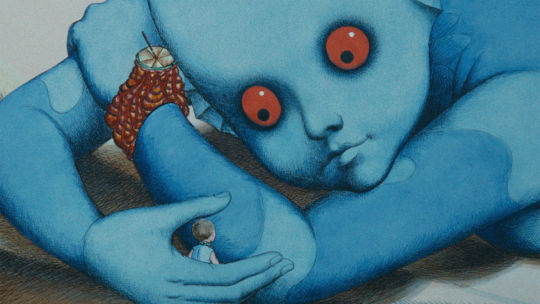



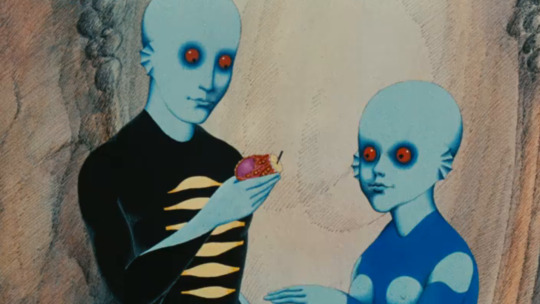
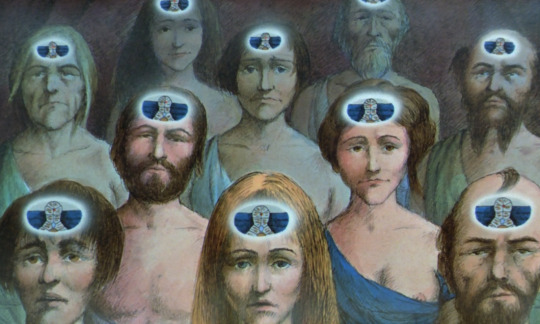

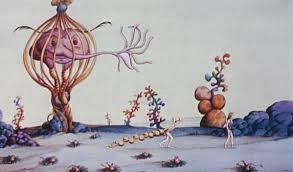

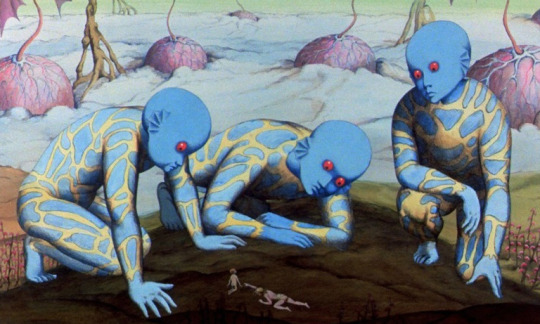
Fantastic Planet (René Laloux, 1973)
Cast (voices): Jennifer Drake, Eric Baugin, Jean Topart, Jean Valmont, Sylvie Lenoir, Michèle Chahan, Yves Barsacq, Hubert de Lapparent, Gérard Hernandez, Claude Joseph, Philippe Ogouz, Jacques Ruisseau. Screenplay: Roland Topor, René Laloux, based on a novel by Stefan Wul. Cinematography: Boris Baromykin, Lubomir Rejthar. Graphic designer: Roland Topor. Film editing: Hélène Arnal, Marta Látalová. Music: Alain Goraguer.
Fantastic Planet" isn't a very satisfactory translation of La Planète Sauvage, the original French title, but the more accurate "Wild Planet" might have led audiences in 1973 to expect a film about a world overrun with motorcycle gangs. Conceived and written by René Laloux and Roland Topor, from a novel by Stefan Wul, designed by Topor and animated by the Jiři Trnka Studio in Prague, Fantastic Planet is a sci-fi fable about the nature of humanity and its place in the universe. The humans in Fantastic Planet are called Oms (from the French hommes), and they are tiny things in a world where the dominant species is the Draags, giant blue humanoid creatures with big red eyes. The Draags consider Oms at best curious little animals and at worst vermin that need periodic efforts at pest control. At the beginning of the film we see a female Om carrying her baby, on the run but being flicked back by a great blue Draag finger each time she thinks she has made it to safety. It turns out that she is being played with by some Draag children, and when the Om mother is accidentally killed, a Draag girl named Tiwa takes the baby as to raise as a pet and calls him Terr. Tiwa outfits Terr with a kind of electronic collar that she can use to pull him back to her if he runs off. As the years pass and Terr grows up, Tiwa tires of her pet and one day he makes his escape and joins up with other Oms, one of whom helps him remove the collar. But Terr has something to share with his rescuers: The Draags receive their education through a headset, and a glitch in Terr's collar has allowed him to listen in on her lessons. Moreover, in his escape, he has stolen Tiwa's headset, and can now share the knowledge possessed by the Draags with his fellow Oms. Eventually, this leads to a revolution in which the Oms are finally able to go to war with the Draags and exploit their vulnerabilities. Much has been made of the fact that the animation was done in Czechoslovakia, beginning in 1967 in the era of the "Prague Spring," and that work on the film was interrupted by the 1968 Soviet invasion. Laloux experienced constant interference from the suspicious authorities, delaying the completion of the film, and the political background adds a piquancy to the finished product. But Fantastic Planet is hardly an allegory of resistance to Soviet repression. It has its roots, as Laloux noted, in the satire of Rabelais, and English speakers will probably find a Swiftian echo in the confrontation of little people and giants. The animation using paper cutouts also recalls Terry Gilliam's work for Monty Python, but the imagination is all Laloux's and Topor's. Alain Goraguer's jazz soundtrack adds immeasurably to the delicate, melancholic tone of Fantastic Planet, giving it a timeless quality where other products of the psychedelic era, like Yellow Submarine (George Dunning, 1968), now seem dated.
87 notes
·
View notes
Text
Février MMXXIV
Films
Maigret voit rouge (1963) de Gilles Grangier avec Jean Gabin, Michel Constantin, Vittorio Sanipoli, Paul Frankeur, Guy Decomble, Françoise Fabian, Paulette Dubost, Laurence Badie, Roland Armontel et Jacques Dynam
L’Étau (Topaz) (1969) d'Alfred Hitchcock avec Frederick Stafford, Dany Robin, Claude Jade, Michel Subor, Karin Dor, John Vernon, Michel Piccoli, Philippe Noiret et John Forsythe
Flic Story (1975) de Jacques Deray avec Alain Delon, Jean-Louis Trintignant, Renato Salvatori, Claudine Auger, Maurice Biraud, André Pousse, Mario David et Paul Crauchet
Poupoupidou (2011) de Gérald Hustache-Mathieu avec Jean-Paul Rouve, Sophie Quinton, Guillaume Gouix, Olivier Rabourdin, Joséphine de Meaux, Arsinée Khanjian, Clara Ponsot et Éric Ruf
Air Force One (1997) de Wolfgang Petersen avec Harrison Ford, Gary Oldman, Glenn Close, Wendy Crewson, Liesel Matthews, Paul Guilfoyle, William H. Macy et Dean Stockwell
Bob Marley: One Love (2024) de Reinaldo Marcus Green avec Kingsley Ben-Adir, Lashana Lynch, James Norton, Henry Douthwaite, Sevana, Hector Lewis et Tosin Cole
Sister Act (1992) d'Emile Ardolino avec Whoopi Goldberg, Maggie Smith, Kathy Najimy, Wendy Makkena, Mary Wickes, Harvey Keitel, Bill Nunn et Robert Miranda
Astérix : Le Domaine des dieux (2014) d'Alexandre Astier et Louis Clichy avec Roger Carel, Lorànt Deutsch, Guillaume Briat, Alexandre Astier, Alain Chabat, Élie Semoun, Géraldine Nakache, Artus de Penguern, Lionnel Astier et François Morel
Race for Glory: Audi vs. Lancia (2024) de Stefano Mordini avec Riccardo Scamarcio, Daniel Brühl, Volker Bruch, Katie Clarkson-Hill, Esther Garrel, Gianmaria Martini : Hannu Mikkola et Haley Bennett
Buster (1988) de David Green avec Phil Collins, Julie Walters, Larry Lamb, Stephanie Lawrence, Ellie Beaven, Michael Attwell, Ralph Brown et Anthony Quayle
Laura (1944) d'Otto Preminger avec Gene Tierney, Dana Andrews, Clifton Webb, Vincent Price, Judith Anderson, Dorothy Adams et Lane Chandler
Séries
Affaires sensibles
Présidentielle de 1995 : un scandale d'Etat - Michèle Mouton, le Groupe B et les Finlandais volants - Les Ecoutes de la République - La secte du temple solaire, le drame d’une société secrète - Munich 1972 : destin tragique d'un rêve olympique - Les révoltés des Jeux olympiques - Le crash de la Germanwings - Alexandre Litvinenko, victime d’un permis de tuer - Martin Luther King : la naissance d’une icône - Martin Luther King : du rêve au cauchemar - Dans l'ombre de Gérard Lebovici - Macron 2017, le traitre méthodique - Kurt Cobain, portrait d’une génération - Crash au mont Saint Odile
Maguy Saison 1
Rose et Marguerite, c'est le bouquet - Babar et Bécassine se mènent en bateau - Docteur j'abuse - L'union fait le divorce - L'annonce faite à Maguy - Le coupe-Georges - Amoral, morale et demie - Cinquante bougies, ça vous éteint ! - A visage redécouvert'' - Le serment d'hypocrite - Tu me trompes ou je me trompe ? - Comment boire sans déboires - Un veuf brouillé - Le père Noël dans ses petits souliers - L'emprunt ruse - Tous les couples sont permis - L'amant de la famille - Travail, famille, pas triste - Blague de fiançailles - Macho, boulot, dodo - Mi-flic, mi-raisin - Trop polyvalent pour être honnête - La traîtresse de maison - Les trois font la paire - Un grain peut en cacher un autre - La quittance déloyale - Belle-mère, tel fils - Manège à quatre - Comme un neveu sur la soupe - Toutou, mais pas ça ! - A corde et à cri - Jamais deux sans quatre - L'amant comme il respire - Le chômage, ça vous travaille ? - La faillite nous voilà ! - Le divin divan - Toubib or not toubib - L'écolo est fini - Loto, route du bonheur
La croisière s'amuse Saison 2
Un contrat en or - Le Magicien - Copie confuse - Un travail d'équipe - Accrochez-vous au bastingage - Le Célèbre Triangle - Joyeux Anniversaire : première partie - Il y a si longtemps déjà - Passion - Un coup de roulis - Docteur, vous êtes fou - La Petite Illusion - Donne moi ma chance - Qui vivra verra - Réunion de travail : deuxième partie - Méfiez vous de votre meilleure amie - Vague à l'âme - L'amour est aveugle - Chassé croisé
Downton Abbey Saison 6
À l'aube d'un nouveau monde - Le Piège des émotions - En pleine effervescence - Une histoire moderne - Plus de peur que de mal - En toute franchise - Aller de l'avant - Les Sœurs ennemies - Le Plus Beau des cadeaux
Kaamelott Livre IV
Le Jeu de la guerre - Le Rêve d’Ygerne - Les Chaperons - L’Habitué - Le Camp romain - L’Usurpateur - Loth et le Graal - Le Paladin - Perceval fait ritournelle - La Dame et le Lac - Beaucoup de bruit pour rien - L’Ultimatum - Le Oud II - La Répétition - Le Discours - Le Choix de Gauvain - Fluctuat nec mergitur - Le Face-à-face : première partie - Le Face-à-face : deuxième partie - L’Entente cordiale - L’Approbation - Alone in the Dark II - La Blessure d’Yvain - Corpore sano II - L’Enchanteur - Les Bien Nommés - La Prisonnière - Les Paris III - Les Plaques de dissimulation - Le Vice de forme - Le Renoncement première partie - Le Renoncement deuxième partie - L’Inspiration - Les Endettés - Double Dragon - Le Sauvetage - Le Désordre et la Nuit
Coffre à Catch
#153 : Finlay, le retour ! - #154 : Gloire aux Heels ! - #155 : Les débuts historiques de Sheamus ! - #156 : Les Bella Twins arrivent à la ECW ! - #18 ; CM Punk continue d'impressionner & quelqu'un fait du vélo ! - #12 : Le Push de CM Punk + Bsahtek le Bikini !
Castle Saison 4
Sexpionnage - Jeux de pouvoir - Une vie de chien - Le Papillon Blue - Pandore, première partie - Pandore, deuxième partie - Il était une fois un crime - Danse avec la mort - 47 secondes - Au service de sa majesté - Chasseurs de têtes - Mort vivant - Jusqu'à la mort s'il le faut
Les Brigades du Tigre Saison 1
Ce siècle avait sept ans… - Nez de chien - Les Vautours - Visite incognito - La Confrérie des loups - La Main noire
Alfred Hitchcock présente Saison 2, 6
Incident de parcours - Pièce de musée - Reconnaissance
The Grand Tour Saison 5
Trop de sable
La ville Noire
Première partie - Deuxième partie
Les Petits Meurtres d'Agatha Christie Saison 3
Mortel Karma
Spectacles
Monsieur chasse (1978) de Alain Feydeau avec Michel Roux, William Sabatier, Françoise Fleury, Yvonne Gaudeau, Pierre Mirat, Xavier Vanderberghe, Michel Mayou, Bernard Durand et Roland Oberlin
La Bagatelle (1977) de Jean Meyer avec Amarande, Patrick Préjean, Jacques Balutin, Brigitte Chamarande Bel, René Lefevre, Pierre Aufrey et Didier Roussel
Femmes en colère (2023) de Stéphane Hillel avec Lisa Martino, Gilles Kneusé, Hugo Lebreton, Nathalie Boutefeu, Fabrice de la Villehervé, Sophie Artur, Clément Koch, Magali Lange, Aude Thirion et Béatrice Michel
La Pélerine écossaise (1972) de Sacha Guitry avec Jean Piat, Geneviève Casile, Philippe Etesse, Robert Manuel, Raymond Baillet, Françoise Petit, Alain Souchères, Janine Roux et Ly Sary
Livres
Piège de chaleur de Richard Castle
Spirou et Fantasio, tome 15 : Z comme Zorglub de André Franquin, Jidéhem et Greg
Kaamelott, tome 1 : L'Armée du Nécromant d'Alexandre Astier, Benoît Bekaert et Steven Dupré
OSS 117 : Tactique Arctique de Jean Bruce
Astérix, tome 17 : Le Domaine des dieux de René Goscinny et Albert Uderzo
4 notes
·
View notes
Text
Songs From The 50s Bracket

"Für zwei Groschen Musik" by Margot Hielscher (Germany) vs "Messieurs les noyés de la Seine" by Fud Leclerc (Belgium)
"Voorgoed voorbij" by Corry Brokken (Netherlands) vs "Sing Little Birdie" by Pearl Carr and Teddy Johnson (UK)
"Giorgio" by Lys Assia (Switzerland) vs "Irgendwoher" by Christa Williams (Switzerland)
"Oui oui oui oui" by Jean Philippe (France) vs "Die ganze Welt braucht Liebe" by Liane Augustin (Austria)
"Lilla stjärna" by Alice Babs (Sweden) vs "Amami Se Vuoi” by Tonina Torielli (Italy)
“Nel Blu Dipinto Di Blu (Volare)” by Domenico Modugno (Italy) vs "Corde della mia chitarra" by Nunzio Gallo (Italy)
"Hou toch van mij" by Bob Benny (Belgium) vs “Dors, Mon Amour” by André Claveau (France)
“La Belle amour” by Paule Desjardins (France) vs "De vogels van Holland" by Jetty Paerl (Netherlands)
"Le Plus beau jour de ma vie" by Mony Marc (Belgium) vs "All" by Patricia Bredin (UK)
"Telefon, Telefon" by Margot Hielscher (Germany) vs "Ne crois pas" by Michèle Arnaud (Luxembourg)
"Im Wartesaal zum großen Glück" by Walter Andreas Schwarz (Germany) vs "Piove" by Domenico Modugno (Italy)
"Ma petite chatte" by Fud Leclerc (Belgium) vs "Uh, jeg ville ønske jeg var dig" by Birthe Wilke (Denmark)
“Skibet skal sejle i nat” by Birthe Wilke & Gustav Winckler (Denmark) vs “Refrain” by Lys Assia (Switzerland)
“Een Beetje” by Teddy Scholten (Netherlands) vs "Il est là" by Dany Dauberson (France)
"Tant de peine" by Danièle Dupré (Luxembourg) vs "Le Temps Derdu" by Mathé Altéry (France)
"So geht das jede Nacht" by Freddy Quinn (Germany) vs “Net Als Toen” by Corry Brokken (Netherlands)
#eurovision#esc#eurovision song contest#tumblr tournament#tumblr polls#tumblr bracket#eurovisionbracket#tumblr tourney#tumblr poll
3 notes
·
View notes
Text
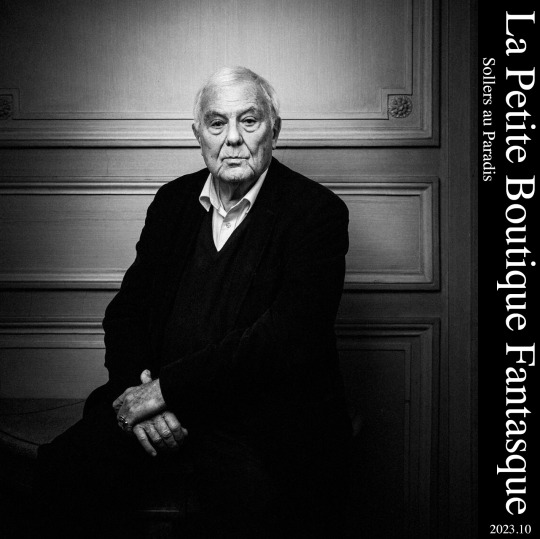
Mercredi 28 juin 2023 à 19H, nouvelle émission de la Petite Boutique Fantasque autour de Philippe Sollers, un compagnon de tant d'années et probablement l'auteur le plus représenté dans la bibliothèque. Il a tellement écrit ! Au delà du romancier, au delà du théoricien restera peut-être ses prises de position toujours à contrepied et son côté pamphlétaire.
Cette émission a été enregistrée et montée au studio de RadioRadioToulouse et diffusée en hertzien, Toulouse : 106.8 Mhz ou en streaming https://www.radioradiotoulouse.net/ et pour tout le reste du temps sur les podcasts de mixcloud.
Programmation musicale : 1) Dix musiques (Michèle Reverdy) Guy Comentale / Laurent Verney / Dominique de Williencourt 2) Casta Diva (Vincenzo Bellini) Maria Callas / Orchestre de la Scala / Tullio Serafin 3) Continuum (Georg Ligeti) Antoinette Vischer 4) Agitato a due venti (Antonio Vivaldi) Cécilia Bartoli / Senatori de le gioiosa marca / Jean-Yves Thibaudet 5) Choeur à bouche fermée de Madame Butterfly (Giacomo Puccini) Choeur et orchestre de l'opéra de Vienne / Wilhelm Loibner + extrait de H (Philippe Sollers) lu par Yaël Dosquet + extrait de la vidéo Sollers au Paradis (Jean-Paul Fargier) + extrait de Lire #11 (Gérard Courant) Le coeur absolu
Pour ceux qui auraient piscine indienne, ou toute autre obligation, il y a une possibilité de rattrapage avec les podcasts de la PBF : https://www.mixcloud.com/RadioRadioToulouse/sollers-au-paradis-pbf-202310/
Sus aux Béotiens !
photographie Frédéric Stucin
4 notes
·
View notes
Text
Contacts
Une Alexandra, deux Alexandre, une Alexia, une Alice, une Aline, un André, une Angélique, deux Anna dont une Anna-Maria, neuf Anne, dont une Anne-Charlotte et deux Anne-Gaëlle. Une Anouk. Un Anthony, un Antoine, deux Arnaud, deux Aurélie, deux Aurélien. Une banque, une banquière. Un Baptiste, trois Barbara, un Barry, une Béa, un Benjamin, une Bérengère, un Bernard, une Bertha. Trois Camille, deux Carine, trois Catherine, une Cathy, deux Cécile, une Cécilia, une Céline, plusieurs Centres, deux Chantal, deux Christelle, un Christian, deux Christine, un Christophe, deux Claire, une Corinne. Un Damien, un Daniel, une Danielle, deux David, une Delphine, trois Denis, un dentiste, un Didier, un Djib et une Doria. Une Edwige, un Élian, une Éliane, une Élise, un Elliot, une Émeline, trois Émilie, une Emma, un Emmanuel, une Emmanuelle, cinq Éric. Un Fabien, une Fabienne, un Fabrice, une Flavie, une Florence, trois Florent, deux Florian, deux Floriane, deux Franck, deux François dont un F.-C., une Françoise, trois Frédéric, une Frédérique. Une Gaëlle, une Garance, un Gérard, une Ghislaine, un Grégory, deux Guillaume, un Gwenaël. Une Hélène, un hippocampe. Trois infirmières, deux Isabelle. Un Jack, un Jamal. Un Jean-François, un Jean-Marc, un Jean-Philippe, cinq Jérôme, un João, un Johann, un Jordane, une Judith, une Julie, huit Julien. Une Katy, un Kervin, deux kinés. Deux Lætitia, deux Laurence, trois Laurent, une Leslie, un Lewis, trois librairies, un Louis, une Louna, un Luc. Une Manon, un Marc, une Mariane, quatre Marie, une Marina, deux Marine, une Marion, un Martin, deux Martine, un Matthieu, une Mathilde, deux Maud dont une Maud-Elisa, deux Michèle, deux Mickaël, un Mirko, une Morgane, une Murielle, une Myriam. Une Nadine, une Nani, une Natacha, neuf Nathalie, une Néda, deux Nelly, un Nico et un Nicolas, un notaire. Une Odile, trois Olivier, un orthodontiste, une Oskia. Une Pamela, deux Pascal, deux Patrick, une Pauline, une Perrine, cinq Philippe, un Pierre, un Pierrick, un plombier. Une Quitterie. Un Raoul, un Raphaël, un Rémi, deux Renaud, une Rieko, deux Robert, un Roland, deux Rose dont une Rose-Marie. Une Sabine, une Sabrina, une Sandrine, une Sandy, quatre Sarah, un Séb et un Sébastien, un Serge, trois Séverine, un Simon, une Solenne, cinq Sophie, deux Stéphane, un Swan, une Sylvie. Un Théo, un Thibaud, deux Thierry, un Tony. Trois Valérie, un Victor, une Viki, quatre Vincent, trois Virginie. Un Wilfried. Un Xavier. un Yannick, un Yarol.
10 notes
·
View notes
Text
[Analysis] Elle (2016)
WARNING: This analysis contains spoilers.
Elle is directed by Paul Verhoeven, based on the French novel Oh by Philippe Dijan, starring Isabelle Huppert. Watching the film gives the feeling of listening to an atonal piece of music. You may think you can predict where the piece would go but then it does not. The same can be said about Elle. It bamboozles the audience with swerve after swerve of genre: it starts as a thriller, which then gives space for a familial comedy; at a later point, more elements of a detective mystery are written in; sandwiched in between are a psycho-sexual drama and a melodramatic slice-of-life. This film could easily become a convoluted mess but it does not since at the center holding everything together is Michèle, the film's charismatic main character.
Even though the film incorporates plenty of genres, the film still has a central theme: without the masks they put on to seem well-adjusted in front of others, humans are all monsters - a gorgeously misanthropic outlook on human nature. Indeed, the film spends most of its runtime exploring the monstrous, shameful things every character does underneath the facade they put on. A snippet of a conversation between Michèle and her mother, Irène, sums up the movie’s theme really well:
Irène: He’s just a man. (about Michèle’s father, who is a mass murderer)
Michèle: Who happens to be a monster.
As the film's main character, Michèle is the one who helps the theme transpire. Michèle is a fascinating multi-dimensional character and Huppert embodies her effortlessly. She manages to bring out the contradictory aspects of the character with a breeze. Huppert’s Michèle is full of flaws and shameless but at the same time, charismatic and fascinating. Although she first appears powerless, throughout the film, she exudes nothing but control and power. Her actions make the audience gasp due to its controversial nature but they cannot help being captivated by her, admiring her and as the result, rooting for her. You can love her or hate her but one thing for sure, she will keep you interested from beginning to end.
It can be said that Elle is a character-driven film. It keeps the audience hooked not by the story, but rather, the larger-than-life personality of its main character. They have to keep asking: What will this woman do next? How will she fascinate us next? Therefore, to understand the film, one must analyze its main character, Michèle. Her personality is shown through her interactions with other characters. Towards men and her mother, she showcases her dominance over them and distrust in them. She treats them with quiet exasperated toleration. With the men around her, she has the extra task of handling their emotional needs and fragility. In return to being the shepherd for others, Michèle treats them as objects, to be manipulated and exploited for her own good.
Irène: What would you say if I remarried?
Michèle: It’s simple, I’d kill you. No need to think.
In Michèle’s eyes, Irène - her mother, is a burden. Her mother uses Michèle’s money to give them to her lovers and plastic surgery. She also sees Irène as an emotionally manipulative person, and distrusts her as Irène used to dramatize things for attention. When Irène actually has a stroke, only until Michèle hears the confirmation from the doctor does she believe her mother is not faking it and actually faces death. In addition, Irène disregards Michèle’s thoughts and feelings. Michèle only tolerates Irène because it is her mother. Overall, the relationship between the two women is tense.
Georges Le Blanc is Michèle’s father. He is a mass murder who went on a killing spree in the neighborhood, murdering 27 people. Afterwards, he returned home and burnt everything with Michèle, who was 10 years old at the time. In the aftermath, reporters snapped a photo of Michèle with empty eyes and ever since, she was considered a psychopath, just like her father. Michèle considers her father “a monster” and herself as a victim of Georges. She has spent her entire life fearing him and getting away from his haunting shadow. One of her fears is becoming like her father so she puts great efforts in distancing herself from him, both physically and mentally. She is not much of a Catholic. She cares for her son and does not treat him like how her father treated her. She does not resort to killing people uncontrollably even though she can injure them gravely.
However, as the curse of blood goes, she still takes after her father’s lurking violence and immorality. She would do whatever to please herself, even if it was at the expense of others. She seduces her married neighbor and sleeps with her best friend’s husband. She is abrasive towards other people and has a tendency to treat them as disposable; however, at the same time, she is possessive of them, be it her ex-husband, her son or her best friend. This contrast creates a really toxic dynamic in which Michèle tosses and turns others as she pleases.
The relationship between Michèle and her parents provides an explanation and insights into Michèle’s personality. It seems that her nonchalant facade and closed-off personality are her defense mechanisms for self-preservation due to the actions of her parents. The two figures who should be the ones to protect betrays her, only bringing her trauma and problems. Because of her father’s murders and its aftermath, Michèle grows to distrust authority, police, reporters in particular and people in general. She builds a wall around herself to hide everything about her, her light-hearted side, her dark impulses, and especially her vulnerability. She is obsessed with being in control because she needs to build herself up after the tragedies brought upon her.
There is a discrepancy of empathy for Georges between Irène and Michèle. Irène still regards him as a human while Michèle sees him as a monster. Her mother continuously pressures Michèle to go visit Georges as he grows old and ill, completely refusing to see things from Michèle’s point of view. Eventually, Michèle decides to go visit her father in prison. However, against her mother’s wishes, it is not to forgive and reconcile with him but to “spit him in the face”. She also prepares nine bullet points to talk to him and given their relationship, those words cannot be nice. At the prison, the warden tells her that her father had committed suicide and Michèle asks him when he was told about her visit. The answer reveals that he killed himself because he knew his daughter would come. The last thing Michèle says to her father’s body is: “I killed you by coming here.” She delivers the line with her usual nonchalance yet it is filled with quiet triumph. At the end of the film, Michèle does not erase the profanity on her father’s plaque and only puts flowers on her mother’s. This shows that she does not forgive and forget.
To other men in Michèle’s life, she is the one who takes care of their emotional needs and fragility, as well as material needs. However, given that the one who takes care of you is who has power over you, she still asserts domination over them. It can be said that through caring for others, Michèle dictates their lives. This dominion gives Michèle free range to treat people as disposable and toys to play with, knowing no matter how badly she treats them, they still need her. At the same time, Michèle is also really possessive to those same people. It is like how a tyrant needs subjects to rule over.
The first example is Richard, Michèle’s ex-husband. He is a writer with a lack of self-esteem and in need of validation. The film hints that Michèle has a background in publishing, which means that she must have helped Richard with his career. Later in the film, Michèle also appoints an employee to hear Richard’s pitch of a new game. Although they are divorced due to Richard hitting her, Michèle is still jealous of his new relationship and seeks revenge by putting a toothpick inside his new girlfriend’s food.
The second example is Michèle’s male staff. Michèle is the head of a game company with a majority of male staff. They are intimidated by her and prone to be defiant to her criticism due to her being a woman in a male-dominated field. One of them, Kurt, hates Michèle because she constantly and mercilessly criticizes him, even if she was right. He casts doubt upon Michèle’s professionalism in game design even though her company has released successful games before. Kevin, another employee, insults Michèle in front of the entire company even though he shows his likeness to her. The male staff, whether they love her or hate her, still harms Michèle in one way or another. However, with a simple compliment, she keeps Kurt under her thumb. It is only that vindictive after being berated so often. Kevin is allowed to stay but only when he agrees to submit to Michèle’s authority. As mentioned, no matter how badly she treats them, they still need her.
Nowhere does this duality of carer - controller more clearly shown than the relationship between Michèle and her son, Vincent. She is the one who pays for his expenses such as rent, car, and so on, as well as giving him jobs. She still has to placate Vincent’s irresponsibility and childishness. However, she is obviously not happy doing so. She tolerates her son like she tolerates her mother - he is a nuisance that she cannot shrug off.
Michèle: You realize having a child is all about suffering. Vincent’s birth was sheer hell. Torture. Three hours of agony.
Michèle is not maternal towards Vincent. She views motherhood as neither joyful nor meaningful. She does not pretend that it brings her happiness or fulfillment. Michèle openly despises Vincent, criticizing him to his face, sometimes in front of others. He is the summation of everything she dislikes. Vincent is a retail worker who has dubious work ethics while Michèle is the head of a successful game company. He is rather dumb and an airhead while Michèle is cunning and calculating. He is a carpet for people to trample on while Michèle dictates and makes people submit, him included.
Though Michèle berates Vincent often, she is still possessive of him. When Vincent was born, Anna - Michèle’s best friend, also gave birth to her own child. However, Anna’s child died at birth. Anna then asked to breastfeed Vincent and Michèle agreed. As he grows up, Vincent has a better relationship with Anna, which makes Michèle jealous. She harbors that jealousy then as she does now.
It seems that Michèle savors how Vincent always runs back to her, no matter how harsh she is towards him. A lot of reviewers only focus on how incompetent Vincent is but in the end, he is actually the one who saves Michèle. The relationship between Michèle and Vincent mirrors that of Michèle and Irène; though Michèle is harsh to her mother, she does not abandon Irène when the latter is ill. It is true, as Irène says, “Some bonds never break.”
Michèle’s duality of carer - controller is taken to a satirical extreme in her relationship with her and Patrick - at first, the married neighbor whom Michèle wants to seduce and later revealed, the masked rapist at the beginning of the film. The depiction of this relationship is the most controversial aspect about Elle. Taking it as literal, it is easy to label the film misogynistic. However, that claim stands up to a lot of challenges.
The first counterpoint is that men are not depicted favorably in Elle. The film shows that, “See, all men are rapists.” All the male characters in the film are under suspicion for the crime shown at the beginning of the film. All of them are shown as the potential perpetrator because they have motive to do so to Michèle. The men around Michèle are either pathetic, fragile and childish like Kurt, Kevin, Richard, Vincent or downright monsters, like Patrick and Georges. They are all just disappointment and Michèle treats them all like disposable trash. They are only allowed to benefit from her so long as they submit to and serve Michèle.
The second counterpoint is that the dynamic scale of the relationship between Michèle and Patrick tips to the former flavor. After Michèle is raped, she remains composed and resumes with her everyday life as if that incident did not matter, was a mere trivial inconvenience. She does not let it define her or dictate how she would live her life. Michèle is completely nonchalant.
Later, Michèle buys a bottle of pepper spray, an axe and later a gun to protect herself. She is also determined to find who the rapist is, even using illegal means. She is out to seek vengeance and this is the closest to anger she shows.
Michèle then enters a cat-and-mouse game of seduction with Patrick. It is critical to remember that Michèle already has eyes on Patrick before discovering that he is the rapist she is looking for. Her continuing with the game despite the revelation of Patrick’s true identity shows that she may be surprised and accept that she is rather fascinated by someone who can usurp her sexually, something which many of her lovers fail to do. Even so, in this game, Michèle still holds the knife.
Michèle manipulates Patrick into recreating the rape. When she successfully baits him and shows her willingness, Patrick instantly wilts. He does not know what to do with a woman who owns her sexuality.
Later, when Michèle gets into an accident, she calls Patrick for help. This shows that he has no power over her whatsoever, despite what he has done.
Near the end, Michèle has an epiphany: there may be other victims of Patrick. She considers going to the police and puts an end to their relationship.
When Vincent kills Patrick, Michèle covers her son with the police, not disclosing the cat-and-mouse game they played. In her eyes, a piece of trash is swept out.
The third counterpoint against the misogynistic claim is that Michèle preserves her bright side for another female character - Anna, her best friend. Anna is the only one who can tease a smile out of her. When Anna finds out that Michèle slept with her husband, she dumps him and remains best friends with Michèle. Their relationship is intact and the ending implies that it may turn romantic.
Overall, Elle is an intricate film. The more you think about it, the more fascinating it becomes. Tinged with cynical satire and worldview, it is brilliantly acted and compelling. Different genres are seamlessly sewn together and do not clash or become convoluted, an impressive feat.
3 notes
·
View notes
Text

La guerre du roquefort - Gérard Muller
Michèle, productrice de roquefort et patronne de la maison Fabre, souhaite agrandir sa cave d’affinage. Quelle n’est pas sa surprise d’y découvrir un cadavre en parfait état de conservation alors qu’il est habillé suivant la mode des années 70, et que des liasses de billets de 500 francs reposent à côté de lui en compagnie d’une vingtaine de lingots d’or. C’est le début d’une enquête confiée au lieutenant Jean-Philippe Courbe, chef de la brigade de gendarmerie de Saint-Affrique. Ce cosy crime permettra également au lecteur de découvrir comment le célèbre fromage est fabriqué dans la région des Causses au sud de l’Aveyron et l’ambiance particulière de ce coin de France.
Gérard Muller, Académicien des Livres de Toulouse et fin gourmet, a trouvé dans le roman policier une façon de valoriser ses passions en plaçant ses personnages au cœur même de l’action. Ainsi, dans ce livre, le lecteur parcourt la belle région des Causses, située au sud de l’Aveyron, et visite les nombreuses caves que le temps a creusées dans cette roche calcaire dont la température, l’humidité et la ventilation sont propices à la fabrication et l’affinage du roquefort. Gérard Muller a écrit plus de 30 polars qui se déroulent en Occitanie pour la plupart, et autant de romans de fiction dont l’intrigue explore tous les continents, de l’Australie en Amérique, de l’Afrique au Moyen-Orient, et de l’Europe à l’Asie. L’écrivain a gagné de nombreux prix littéraires pour ses livres et ses recueils de nouvelles.
ISBN : 979-10-310-1515-6 11,5 X 17, 194 pages, 11,00 €
0 notes
Text
Angelique and the King (1966)
Director: Bernard Borderie Starring: Michèle Mercier, Robert Hossein, Jean Rochefort In the third of the Angélique series, the heroine is sent on a mission by King Louis XIV, and later finds herself the subject of rumors. Angelique is back for another adventure. In the previous film Angelique married her cousin, Philippe de Plessis-Bellières. At the start of ‘Angelique and the King’ Philippe…

View On WordPress
0 notes
Text
An aging thief hopes to retire and live off his ill-gotten wealth when a young kid convinces him into doing one last heist. Credits: TheMovieDb. Film Cast: Nick Wells: Robert De Niro Jack Teller: Edward Norton Max: Marlon Brando Diane: Angela Bassett Burt: Gary Farmer Steven: Jamie Harrold Danny: Paul Soles Jean-Claude: Martin Drainville Laurent: Serge Houde André: Jean-René Ouellet Albert: Claude Despins Sapperstein: Richard Waugh Sapperstein’s Cousin: Mark Camacho Woman in Study: Marie-Josée Colburn Man in Study: Gavin Svensson Tuan: Thinh Truong Nguyen Cop: Carlo Essagian Drunk: Christian Tessier Storekeeper: Lenie Scoffié Tony: Bobby Brown Philippe: Maurice Demers Guard: Christian Jacques Guard: Henry Farmer Guard: Dacky Thermidor Guard: Gerard Blouin Old Engineer: Charles V. Doucet Worker: Pierre Drolet Bureaucrat Official: Norman Mikeal Berketa Ironclad Tech: Eric Hoziel Janitor: John Talbot Thug: Richard Zeman Thug: Nick Carasoulis Special Appearance: Cassandra Wilson Special Appearance: Mose Allison Man at Airport (uncredited): June Järvenpää Film Crew: Original Music Composer: Howard Shore Editor: Richard Pearson Director: Frank Oz Director of Photography: Rob Hahn Story: Kario Salem Screenplay: Lem Dobbs Producer: Lee Rich Screenplay: Scott Marshall Smith Producer: Gary Foster Production Design: Jackson De Govia Costume Design: Aude Bronson-Howard Script Supervisor: Rebecca Robertson Casting: Margery Simkin Key Makeup Artist: Francine Gagnon Key Hair Stylist: Corald Giroux Makeup Effects: Matthew W. Mungle Construction Coordinator: Alain Brochu Supervising ADR Editor: Marissa Littlefield Sound Effects Editor: Paul Urmson Story: Daniel E. Taylor Art Direction: Tom Reta Set Designer: Félix Larivière-Charron Camera Operator: Nathalie Moliavko-Visotzky Dialogue Editor: Nicholas Renbeck Art Department Coordinator: Genevieve Ferderber Set Designer: Lucie Tremblay First Assistant Director: David Sardi Boom Operator: Markus Wade Music Editor: Suzana Peric Property Master: Denis Hamel Art Direction: Claude Paré Rigging Grip: Alain Brouillette Supervising Sound Editor: Ron Bochar Stunt Coordinator: Jean Frenette Set Decoration: K.C. Fox Production Manager: Alain Gagnon Set Designer: Céline Lampron Greensman: Ray Légaré Boom Operator: Nathalie Piche Still Photographer: Phillip V. Caruso Steadicam Operator: Angelo Colavecchia First Assistant Camera: Maarten Kroonenburg Location Manager: Michèle St-Arnaud Prop Maker: Patrice Jacques Set Designer: Charlotte Rouleau Sound Re-Recording Mixer: Lee Dichter Special Effects Supervisor: Louis Craig Chief Lighting Technician: Jean Courteau Production Coordinator: Victorine Tamafo Set Designer: Claude Lafrance Foley Editor: Kam Chan Dialogue Editor: Fred Rosenberg Stunt Coordinator: Bud Davis Armorer: Julie Coulombe Art Department Coordinator: Michelle Drolet First Assistant Camera: Tony Rivetti Sr. Sound Effects Editor: Lewis Goldstein First Assistant Editor: Richard Friedlander Art Department Coordinator: Michel Bouchard Foley Editor: Frank Kern Dolly Grip: Alain Masse Production Controller: George Lakes Armorer: Brent Radford Executive Music Producer: Budd Carr Executive Producer: Adam Platnick Executive Producer: Bernard Williams Stunt Coordinator: David Leitch Movie Reviews: JPV852: A go-to for a solid heist-thriller that features two great performances by De Niro and Norton with honorable mention to Brando who looked a little worse for wear. Not the top notch in the genre but still a breezy but still suspense-filled watch if you don’t want anything thought-provoking. Still makes me chuckle that it was Frank Oz to be the one to direct three generations of great actors… **3.75/5**
#assumed identity#blueprint#customs house#jewel#jewelry heist#one last job#quebec#scepter#schematic#surveillance camera#Top Rated Movies
0 notes
Text

#ProyeccionDeVida
🎥 Cine Italiano, presenta:
🎬 “EL MAGNÍFICO CORNUDO” [Il Magnifico Cornuto / The Magnificent Cuckold]
🔎 Género: Comedia / Romance
⏰ Duración: 124 minutos

✍️ Guión: Diego Fabbri, Ruggero Maccari y Ettore Scola
🎼 Música: Armando Trovajoli
📷 Fotografía: Armando Nannuzzi (B&W)
🗯 Argumento: Andrea, convencido de lo fácil que le resulta a una mujer engañar a su marido, empieza a albergar dudas sobre la fidelidad de su bellísima mujer, Mariagrazia. Pero, cuando la duda se convierte en obsesión, su conducta respecto a ella se vuelve completamente disparatada, hasta el punto de acosarla sin tregua, exigiéndole que le dé el nombre de su amante.

👥 Reparto: Claudia Cardinale (Maria Grazia), Ugo Tognazzi (Andrea Artusi), Michèle Girardon (Cristiana), Bernard Blier (Mariotti), Paul Guers (Gabriele), Philippe Nicaud (Doctor), Salvo Randone (Belisario), Gian Maria Volonté (Assesseur), Susy Andersen (Wanda Mariotti), Alfonso Sansone y Edda Ferronao (Younger Maid)
📢 Dirección: Antonio Pietrangeli
© Productoras:Les Films du Siecle, Roxy Film & Ultra Film
🌏 Países: Italia-Francia

📅 Año: 1964
📽 Proyección:
📆 Jueves 18 de Julio
🕔 6:30pm.
🏡 Auditorio Leonardo Da Vinci del Instituto Italiano de Cultura (av. Arequipa 1055, Urbanización Santa Beatriz - Lima)
🚶���️🚶♂️ Ingreso libre

🎤 El dato: Después de la proyección se realiza el Conversatorio: "Celos a la Italiana. Una divertida sátira social".
0 notes
Photo
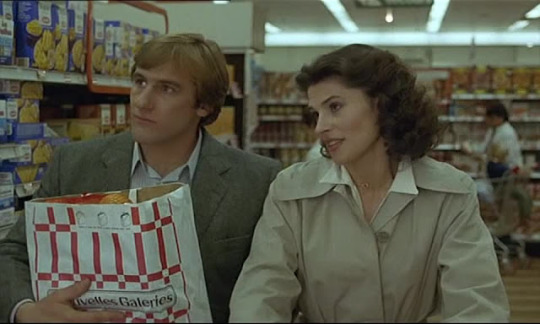
Gérard Depardieu and Fanny Ardant in The Woman Next Door (François Truffaut, 1981) Cast: Gérard Depardieu, Fanny Ardant, Henri Garcin, Michèle Baumgartner, Véronique Silver. Screenplay: François Truffaut, Suzanne Schiffman, Jean Aurel. Cinematography: William Lubtchansky. Music: Georges Delerue. François Truffaut's penultimate film skims along the surface of romantic melodrama (not to say soap opera) without ever really picking up any of that genre's essential energy the way filmmakers like Douglas Sirk or his great European admirer Rainer Werner Fassbinder were able to do. It's a film full of Truffaut touches, such as having the story introduced by a secondary character, Mme. Jouve (Véronique Silver), an older woman who has her own history of disastrously blighted love. Mme. Jouve even orders the camera about as she sets up the narrative. There are also some intriguing details about the characters that seem to have symbolic potential. For example, both husbands, Bernard (Gérard Depardieu) and Philippe (Henri Garcin), have managerial jobs that involve transportation: Philippe is an air traffic controller, and Bernard trains the captains of supertankers, working in a large outdoor scale model of a harbor for tankers -- a job that superficially resembles the one Antoine Doinel held in Truffaut's Bed and Board (1970), except that Bernard takes it much more seriously than Antoine did. Unfortunately, there's not much story here: Bernard and Matilde (Fanny Ardant) had been lovers, and after their separation each married someone else. Now Matilde and Philippe have moved in next door to Bernard and Arlette (Michèle Baumgartner), and the old love affair resumes, with painful results. It's only the finesse in the direction and acting, and the attention to secondary details, that give The Woman Next Door resonance and depth -- though perhaps not enough.
4 notes
·
View notes
Text
Novembre MMXXIII "November Who"
Films
Dr. Who and the Daleks (1965) de Gordon Flemyng avec Peter Cushing, Roy Castle, Jennie Linden, Roberta Tovey, Barrie Ingham, Michael Coles et Yvonne Antrobus
Ripoux contre ripoux (1990) de Claude Zidi avec Philippe Noiret, Thierry Lhermitte, Guy Marchand, Jean-Pierre Castaldi, Grace de Capitani, Line Renaud, Michel Aumont et Jean Benguigui
Coup de foudre et Conséquences (Fools Rush In) (1997) d'Andy Tennant avec Matthew Perry, Salma Hayek, Jon Tenney, Carlos Gómez, Tomás Milián, Siobhan Fallon et John Bennett Perry
Au-delà des grilles (Le mura di Malapaga) (1949) de René Clément avec Jean Gabin, Isa Miranda, Véra Talchi, Andrea Checchi, Robert Dalban et Ave Ninchi
Clemenceau, la force d'aimer (2023) de Lorraine Lévy avec Pierre Arditi, Emilie Caen, Elizabeth Bourgine, François Marthouret, Serge Riaboukine et Arthur Choisnet
L'Argent des autres (1978) de Christian de Chalonge avec Jean-Louis Trintignant, Catherine Deneuve, Laura et Michèle Kornbluh, Claude Brasseur, Michel Serrault, Gérard Séty et Jean Leuvrais
Mort sur la piste (2023) de Philippe Dajoux avec Jason Priestley, Eléonore Bernheim, Olivier Marchal, Roby Schinasi, Adèle Galloy et Olivia Courbis
Sylvia Scarlett (1935) de George Cukor avec Katharine Hepburn, Cary Grant, Brian Aherne, Edmund Gwenn, Nathalie Paley et Dennie Moore
La Cité sous la mer (City Beneath the Sea) (1953) de Budd Boetticher avec Robert Ryan, Mala Powers, Anthony Quinn, Suzan Ball, George Mathews, Karel Stepanek, Hilo Hattie et Lalo Rios
Second Tour (2023) de Albert Dupontel avec Cécile de France, Albert Dupontel, Nicolas Marié, Scali Delpeyrat, Jackie Berroyer, Christiane Millet, Philippe Uchan, Renaud Van Ruymbeke et Bouli Lanners
Seuls les anges ont des ailes (Only Angels Have Wings) (1939) de Howard Hawks avec Cary Grant, Jean Arthur, Richard Barthelmess, Rita Hayworth, Thomas Mitchell, Allyn Joslyn, Sig Ruman et Victor Kilian
Un pyjama pour deux (Lover Come Back) (1961) de Delbert Mann avec Rock Hudson, Doris Day, Tony Randall, Edie Adams, Jack Oakie, Jack Kruschen, Ann B. Davis : Millie et Joe Flynn
Le Couteau dans la plaie (1962) d'Anatole Litvak avec Sophia Loren, Anthony Perkins, Gig Young, Jean-Pierre Aumont, Régine, Yolande Turner, Tommy Norden, Mathilde Casadesus et Elina Labourdette
Garde à vue (1981) de Claude Miller avec Lino Ventura, Michel Serrault, Romy Schneider, Guy Marchand, Pierre Maguelon, Jean-Claude Penchenat et Elsa Lunghini
La Sanction (The Eiger Sanction) (1975) de Clint Eastwood avec Clint Eastwood, George Kennedy, Vonetta McGee, Jack Cassidy, Heidi Brühl, Thayer David, Reiner Schöne, Michael Grimm et Jean-Pierre Bernard
Deux Hommes dans la ville (1973) de José Giovanni avec Jean Gabin, Alain Delon, Michel Bouquet, Mimsy Farmer, Victor Lanoux, Ilaria Occhini, Guido Alberti, Cécile Vassort, Bernard Giraudeau et Christine Fabréga
JFK (1991) de Oliver Stone avec Kevin Costner, Tommy Lee Jones, Gary Oldman, Kevin Bacon, Laurie Metcalf, Jay O. Sanders, Michael Rooker, Sissy Spacek, Joe Pesci et Jack Lemmon
Le Juge et l'Assassin (1976) de Bertrand Tavernier avec Michel Galabru, Philippe Noiret, Isabelle Huppert, Jean-Claude Brialy, Renée Faure, Cécile Vassort, Yves Robert, Jean-Roger Caussimon et Jean Bretonnière
Le Fugitif (The Fugitive) (1993) d'Andrew Davis avec Harrison Ford, Tommy Lee Jones, Sela Ward, Julianne Moore, Joe Pantoliano, Andreas Katsulas, Jeroen Krabbé et L. Scott Caldwell
Un singe en hiver (1962) de Henri Verneuil avec Jean Gabin, Jean-Paul Belmondo, Suzanne Flon : Suzanne Quentin, Gabrielle Dorziat, Hella Petri, Marcelle Arnold, Charles Bouillaud et Anne-Marie Coffinet
Doctor Who (1996) de Geoffrey Sax avec Sylvester McCoy, Paul McGann, Eric Roberts, Daphne Ashbrook, Yee Jee Tso, John Novak et Michael David Simms
Séries
Doctor Who Saison 19, 20 Series 1, 3, 11, 5, 4
Castrovalva - Four to Doomsday - Kinda - The Visitation - Black Orchid - Rose - La fin du monde - Des morts inassouvis - Earthshock - Time-Flight - Destination: Skaro - Ark of Infinity - La Famille de sang - Smith, la Montre et le Docteur - The Day of the Doctor - Snakedance - The Star Beast - The Ghost Monument - Le Colocataire - La Chute de Pompéi
Top Gear Saison 20
A l'abordage ! - Ils ont roulé sur l'eau - Mission Camping-Car
Brokenwood Saison 8, 5, 4, 3
Quatre incendies et un enterrement - Dix petits héritiers - Tu ne tueras point - Un Noël rouge
Affaires sensibles
Les étonnantes enquêtes du bureau des ovnis - 1975, l'année de la femme - Caravelle Ajaccio-Nice : un crash secret Défense ?
Coffre à Catch
#140 : "Elles répondaient au nom de Bella" (avec Max MK) - #141 : Qui sera le futur Mr Money in the Bank? - #142 : Y'a R les amis!! Y'a R ! - #143 : Tiffany prend les rennes et Finlay prend la Trique !
Happy Days Saison 4
De l'huile sur le feu - Remise des prix : première partie - Remise des prix : deuxième partie - Le Jour J est arrivé - Les Mauvais Garçons - Howard inventeur - Le Chien de Fonzie - Ralphy a de sacrés ennuis - Le Baptême de Fonzie
Downton Abbey Saison 4
La Succession - Lettre posthume - Faste et Renaissance - Le Prétendant - Rien n'est terminé - Une vraie surprise - Dernières Festivités
Professeur T Saison 1
Anatomie d'un souvenir - Un poisson nommé Walter - Règles d'or - L'amour d'une mère - Sophie sait tout - Le fils dévoué
The Crown Saison 6
Persona Non Grata - Deux photographies - Dis-Moi Oui - Onde de choc
Spectacles
Prom 10 : Doctor Who at the Proms (2010) avec Karen Gillan, Arthur Darvill et Matt Smith
Taratata 30 (2023)
La symphonie des jeux vidéos aux Chorégies d'Orange (2021)
Doctor Who at the Proms (2013) avec Neve McIntosh, Dan Starkey, Matt Smith, Jenna Coleman, Carole Ann Ford, Peter Davison, Nicholas Briggs, Ben Foster et Murray Gold
Le vison voyageur (2023) de John Chapman et Ray Cooney avec Michel Fau, Sébastien Castro, Armelle, Nicole Calfan, Anne-Sophie Germanaz, Alexis Driollet, Delphine Beaulieu et Arnaud Pfeiffer
Doctor Who: A Celebration (2006) avec David Tennant, Murray Gold et Russell T Davies
Drôle De Genre (2023) de Jade-Rose Parker avec Victoria Abril, Lionnel Astier, Axel Huet et Jade-Rose Parker
Prom 13: Doctor Who Prom (2008) avec Freema Agyeman, Noel Clarke, Camille Coduri et Catherine Tate
Livres
Doctor Who le dixième docteur, Tome 1 : Les révolutions de la terreur de Elena Casagrande, Nick Abadzis et Arianna Florean
Les contes du vortex de Pepperpot x Friends (Pauline Cadart Serizel, Marie Valerio, Rémi Germain, Robin Brou, Manon Segur, Julien Cadart Serizel, Flavia Valerio et Gökan Martin)
Le docteur Who entre en scène de Terrance Dicks
Doctor Who le dixième docteur, Tome 3 : Les fontaines de l'éternité de Elena Casagrande et Nick Abadzis
Les Daleks de David Whitaker
2 notes
·
View notes
Text
Revenons à Philippe Robert
Il a toujours agi dans ses intérêts exclusifs. Prenons un exemple. Si mes parents changeaient de magnétoscope, il s imposait et prenait l ancien, sans négociations ni avis. Il a toujours fonctionné ainsi, et il continue. Quand Michèl Robert a quitté le domicile, j étais ado, et le grand frère Philippe majeur, et il était déjà avec sa femme actuelle, et aucune aide en quoi que ce soit pour son…
View On WordPress
0 notes